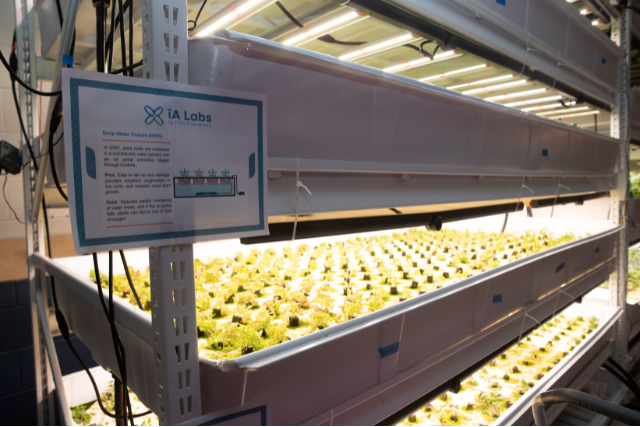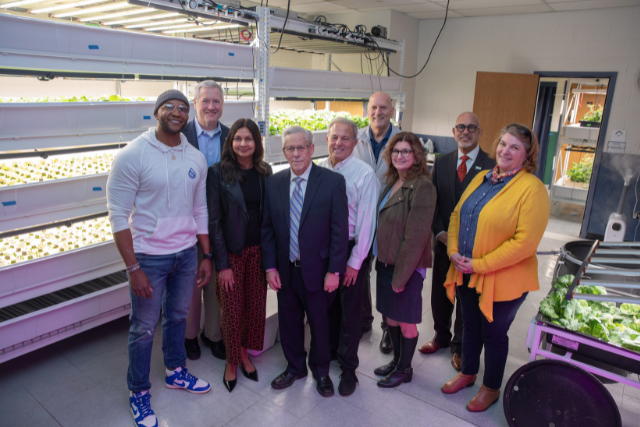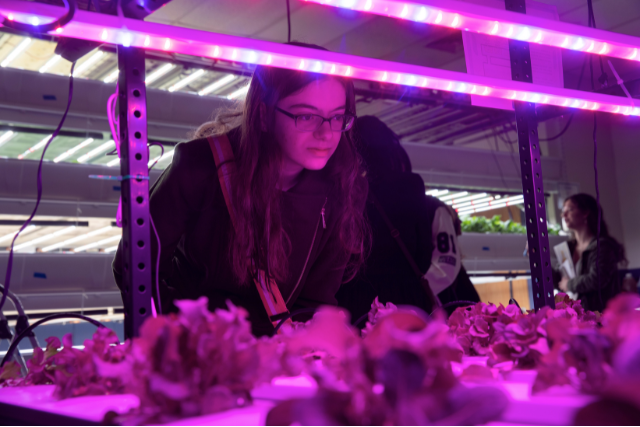
With spring in the air, farmers and gardeners across New Jersey are looking forward to their first early-season harvests after a long winter. But at The College of New Jersey, the growing season never stopped when the cold came.
Microgreens, herbs, lettuces, berries, tomatoes and peppers — they’re all ripe for the picking right now, thanks to the possibilities of hydroponics, an agricultural method that relies on artificial lighting and nutrient-infused water to fuel plant growth, rather than soil and sun.
Inside Armstrong Hall, the 1,295-square-foot Indoor Ag Lab has been quietly setting up shop and testing best growing conditions for the past six months. Its grand opening to the campus community was April 2, and now students across campus are invited to bring their innovative ideas to the highly technical world of indoor farming.
The lab is the product of a partnership between TCNJ’s Schools of Science and Engineering and GeoGreens, a local hydroponic business that has been fighting food insecurity for the past decade by growing produce for communities that live in food deserts.
Student researchers will be integral to the success of the new lab. School of Science Dean Sunita Kramer is eager to see how student research might help answer the many questions posed by the process of hydroponics.
“Is there a more efficient way to make plants grow faster? Can we make the plants more nutritious?” Kramer asks. “There are all kinds of things to optimize and new ways to make use of space and light in more efficient ways. This is a laboratory, a place where students can bring their ideas and think of new ways to do things that can enhance not only their own learning but also contribute to the field.”
The lab has been growing about 150 pounds of fruits and vegetables per month and should nearly double that by the end of summer, once student involvement ramps up, GeoGreens founder Desmond Hayes says. He sees endless opportunity for hands-on education and meaningful research in the lab, given that the nascent indoor agriculture industry is still being shaped. Hydroponic farming utilizes artificial lighting, ventilation, automation and robotics — all of which offer TCNJ students different ways to get involved.
“We’re looking for people to come in and think, ‘I’d like to be involved with this effort.’ The interdisciplinarity of this work is what makes it so exciting,” School of Engineering Dean Andrea Welker says.
In keeping with Hayes’ interest in combating food insecurity, a portion of the food grown in the lab will be available in the college’s food pantry, The Shop. The rest will continue to serve community members — and, eventually, the lab’s partners hope the facility itself can do the same. Rather than restricting its use to the student body, Kramer and Welker want members of the public to get involved in the educational opportunities the lab provides.
“Having an example on campus where students can see how what they learn can mix with what others learn and they can work together to come up with ideas — that’s very exciting,” she says.
“It’s a hub agriculturally and for the community, too,” Hayes says.

— Ben Seal

